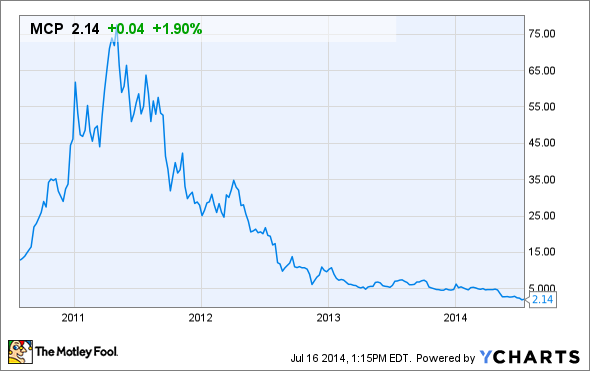
Source: Grupo Mexico
As if the pressure on Molycorp (NYSE: MCP) for a quick turnaround is not already hot and heavy with Apollo Global Management apparently betting on a bankruptcy, Mexico's biggest miner, Grupo Mexico, is taking up the government's offer to finance rare-earth mineral exploration by expanding into the arena.
Just two months ago, Mexico joined the conga line of countries deciding that China's hegemony in rare earths was untenable and, with profits to be made from their widespread use, rare-earth minerals represented an opportunity to line its own coffers. As I noted at the time, North Korea believes it's found the world's largest rare-earth minerals deposit; Japan claims the ocean floor holds more such minerals than all the world's land-based deposits; and Africa and the central-Asian countries of Kazakhstan, Kyrgyzstan, and Tajikistan are believed to be rich in rare-earth minerals, as well.
China supplies some 86% of the world's needs for rare-earth minerals, and the U.S. is a distant second with about 12% of the total supply. Despite the name, however, rare earth minerals aren't all that rare. The problem has been finding them in mineable quantities.
Molycorp's problem is that it got its big impetus from China's decision to restrict supplies in 2010 and 2011, which caused prices of the minerals to skyrocket. That created a bubble, as any mining company with a shovel seemed ready to declare itself a rare-earths miner. Molycorp's stock got caught up in the fever, soaring along with rare-earth prices to around $75 per share. Although the company had a real operation to back it up at its Mountain Pass, Calif., facility, it quickly realized that the expectations that had been built into the market -- and stock prices -- were unsustainable.
As Molycorp's supply hit the market, along with that of industry peer Lynas (LYSCF +0.34%) in Australia, the relief valve was opened, and mineral prices collapsed. Most remain elevated above their pre-restricted trade levels, but some continue to fall. And it just so happens that those that are still falling -- cerium and lanthanum -- are the ones most prevalent at Mountain Pass. So the last thing the miner needs is even more competition.
Yet, reports say that Mexican universities believe the country is home to economically viable deposits of rare earths in the states of Chiapas, Chihuahua, Durango, Hidalgo, Oaxaca, and Sonora, ranging in concentrations from 4% to 15%, suggesting they could be sufficiently mined to give Mexico entrance into the high-tech industry. Grupo Mexico, which is the world's fifth-largest copper producer with existing operations in Sonora and Chihuahua, says it could begin its exploration there as soon as this year with an eye on supplying Korean markets. It already supplies Asia with copper, which makes up approximately 7% of its global sales, and is looking to increase sales to the region.
As the global race to open up new supplies intensifies, Molycorp's position becomes increasingly dire. It's burning through cash at the rate of about $50 million a quarter, and is estimated to have less than a year's worth of cash on hand, absent additional issuances of debt or equity. Apollo Global Management's purchase of the miner's 3.25% convertible notes due 2016, or 22% of the class, seems to bet that Molycorp will need to restructure its heavy $1.5 billion debt load.
Last December, the Pentagon released a report that said, not only had China's death grip on rare-earth minerals relaxed, but there was sufficient global supply to meet demand such that it no longer feared being cut off from the minerals, which it uses to make such things as smart bombs and Tomahawk cruise missiles. In short, it doesn't bode well for a rising-price environment, a condition that Molycorp really needs to sustain itself without having to go through a restructuring.
Shares of the miner fell sharply during the past month, particularly last week, as concern mounted about its future. Molycorp has long been sustained by unrealistic expectations that, as one of the few miners outside of China with a mineable supply of rare-earth minerals, it ought to enjoy an exalted status. The current state of affairs, however, belies that notion, and shows the extreme risk investors are taking on by believing it can turn around without substantially devaluing their investment.







